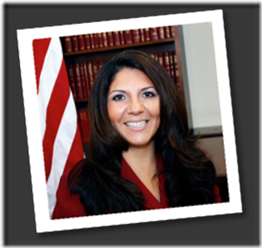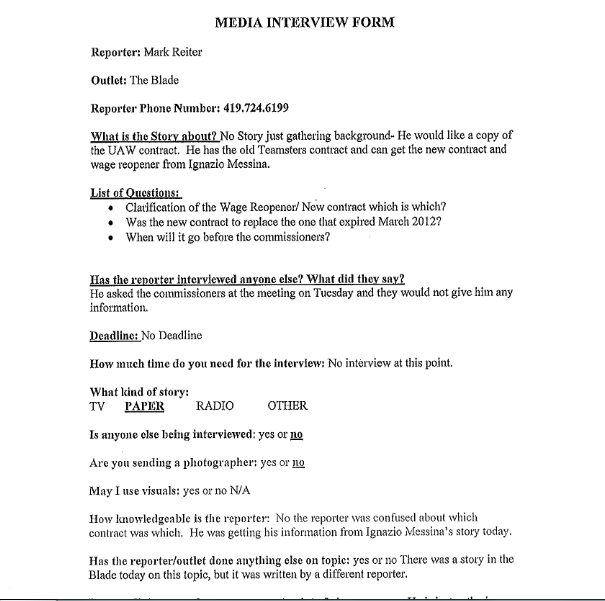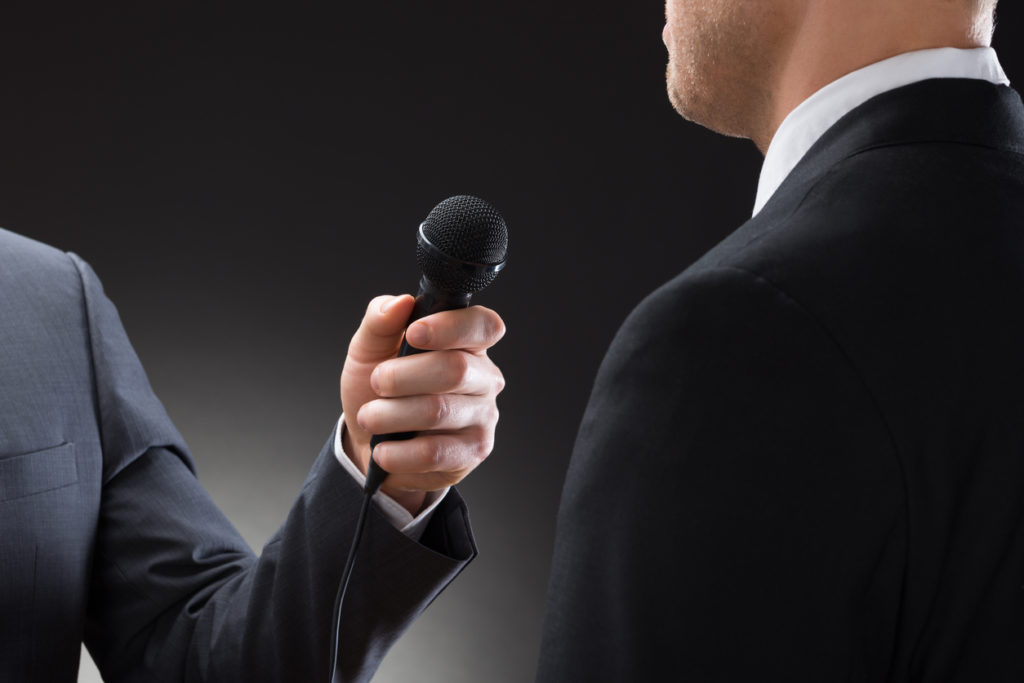The Toledo Blade’s Cheap Shot About Interview Prep
Anita Lopez, a Democratic mayoral candidate in Toledo, Ohio, likes to prepare carefully for her media interviews. She requires her staff to ask questions of reporters before any interview and to complete a form containing details about the story.
So far, I’m on board. That’s a rather typical media strategy, and it’s the kind of responsible due diligence that any smart candidate would employ. But The Toledo Blade suggests she’s going overboard:
“Among the information Ms. Lopez wants in advance is a list of the reporter’s questions; if anyone already has been interviewed; who else will be interviewed; what the other sources said to the reporter; if she can use visuals, and if the reporter is knowledgeable.”
In The Media Training Bible, I warn spokespersons dealing with hard news reporters to avoid asking for questions in advance—and Ms. Lopez shouldn’t insist on questions as a pre-condition for an interview. But the rest of her interview prep looks like the type of typical media relations policy that many businesses, organizations, and candidates employ as a standard operating procedure.
(Here are eight questions to ask before every interview. And here is Ms. Lopez’s form.)
Although that may seem obstructionist, there are legitimate reasons for requesting information in advance. Knowing a reporter’s focus can help a candidate find key statistics or details that may not be top of mind, give the candidate warning that the reporter is on an unwarranted fishing expedition, and prevent them from committing the type of “gotcha” moment that sells newspapers but destroys reputations.
The Blade also knocks Lopez for using “bridging” statements. That’s a cheap shot. Those statements are used by virtually every experienced spokesperson in the country. Perhaps you don’t think politicians should use them—but singling her out for their use is journalistic hackery.
But the most ridiculous comment in the piece goes to Independent Councilman D. Michael Collins, who maintains that the truest response is “one that is extemporaneous.” Any experienced public figure should know the hazards of making it up while you go along: just ask Todd “legitimate rape” Akin, Mitt “47 percent” Romney, or Barack “cling to their guns and religion” Obama. According to his logic, no one should ever practice a speech again.
The bottom line is that it’s a good idea to prepare for interviews in advance. Perhaps it requires a defter touch than the one Ms. Lopez has been using. But many parts of The Blade’s piece feel like a highly selective singling out.
Of course, this is a bit less defensible.
A grateful top o’ the hat to Political Wire and reader Josh Spaulding.
What do you think? Please leave your thoughts in the comments section below.





Well from that brief interview with the Ms. Lopez, I understand why she needs all the help she can get. Pushing the mic down at the start of the interview? Amateurish.
And I’m guessing she gave her staff an ear-full for letting that portion get on the air, probably assuming asking the reporter to stop the taping signified an “off the record” moment.
Paul – I agree with you – the video was absolutely amateurish. I wouldn’t suggest that Ms. Lopez is an ideal spokesperson at all.
What I would say is that The Blade’s piece is totally cherry picked, and makes it look like Ms. Lopez’s media relations approach is an anomaly. It’s not – and the reporter’s insinuation otherwise is unfair.
Thanks for commenting,
Brad
Couldn’t agree with you more, Brad. And I apologize for getting off subject a bit, but I was just shocked by her approach to the reporter.
It seems to me local TV interviewers are doing more and more cherry-picking, either trying to sensationalize the news, or, they just don’t have the air time to invest in a balanced story.
It always amazes me how the media can ignore things that happen every day in the course of business one day, and then get upset about them and make them a focus of a story the next. A few years back we had a significant anniversary at our park, and we enlisted the help of our outside PR agency to help us with the increased media attention we expected to get.
All of the media was given the time that we were making people available for interviews and we would take them to get their turn as they arrived. One newspaper reporter seemed to object to having to wait behind a couple of TV crews and chose to spend the first 2-3 paragraphs of his story complaining about our “PR flaks” and making fun of the fact that they had walkies-talkies to communicate and coordinate the event.
This was a good news story…there was no downside to it. But one reporter in a bad mood can always make something like this a focus if they choose to.
I spent nine years doing PR and communications for state legislators here in Minnesota, here are the thoughts I had reading this post and the story.
I would have asked for the questions but in a general way so as to create more of a two-way conversation between me and the reporter. That would allow me to get a good handle on what to prep my person for and also given me a better overall sense of what the reporter is looking for. Anytime you can encourage that type of conversation I think you’re building a better relationship.
There is almost no situation in which I would have asked who else the reporter talked to AND what the person said. Ideally that would come out in the conversation I mentioned above. If it didn’t and I asked it directly, I can’t think of many reporters in our Capitol press corps that would have obliged. I’m kind of scared of what the response would have been, to be honest. It would make me look like I don’t understand their job. I always found if a reporter knew you get their job they’ll respect you as a professional and the role that you have to do for your guys. Maybe that’s a local thing. The only situation I can think of when I would ask is if it was a very heavy, serious story with some type of scandalous or legal angle that might arise. If I’d done my job building a relationship before this, they’d be willing to share that – maybe.
I also wouldn’t ask if the reporter is “knowledgeable.” It seems condescending. I think all the other questions are fair. But I feel doing it this way creates too much of a stand-offish situation, a genuine conversation would be much better.
What Lopez is asking her staff to do reminds me of working with people who are new to public office and inexperienced with reporters. They’re so nervous about giving the wrong answer that they go overboard trying to give the right one. In that situation I tried to do a little coaching about what a reporter’s job is like so they feel more comfortable. It’s helped, too, to explain to them what my job is when I’m working with a reporter to show that some of what she’s asking for puts me in a bad position, which would be of no benefit to her. If that doesn’t work, trying to schedule some interviews on a topic they know well or take them to a press conference so they can see reporters at work w/o the pressure of having to answer the questions was helpful.
To the Blade’s story, that’s what I would expect from a petulant partisan blogger, not a reporter. It’s pathetic. A total abuse of journalism.
Great comment, Kevin.
I generally agree with your approach (and since you’ve lived it on the political scene, I respect your personal experience). I’m also uneasy with her request to know who else the reporter has spoken with, but for a slightly different reason: I suspect it’s not done with a soft touch. I’ve had plenty of experiences in which I’ve said something along the lines of, “Look, I know you have no obligation to tell me who you’ve been speaking with and what they said, but I would like the opportunity to respond to what you’ve heard. Is there anything in particular that you think would be fair for me to know about in order to be able to offer a response?” I’ve never had a reporter hold that against me, perhaps because of the sincere and deferential first part. Of course, if I’m right about the lack of a soft touch, I can understand why a reporter would bristle.
As for whether or not it’s a “knowledgeable” reporter, this is an internal survey – they’re not asking the reporter that question. Knowing whether the reporter is green or experienced, or has some misconceptions about a specific issue, is relevant information for the candidate.
As for the story itself, I agree completely with your assessment. I mean, just look at their subhead: “Auditor, mayoral hopeful makes staff use form so she’s prepared.” That’s news? That a communications staff fills out a form after contact with a journalist? If so, there should be a few million more stories with the same subhead, given how common a practice this is.
Thanks for writing,
Brad
On the video, I notice that the guy is interviewed with a nice background with trees, while she is interviewed in an ugly parking lot, with the Sun always in her eyes, which gives her a contracted facial expression.
1. She should have defended herself better from this set-up;
2. From this, I know on whose side the reporter was on… this was not a fair news report.
3. Giving explanations about her process of facing the media, she should have been ready to speak without ANY apparent defence from the media. That thing turning down the microphone and asking for consulting time with her experts was just ASKING to be crushed by the reporter (as she was).
Pedro,
Great points – thank you so much for adding your voice to the blog! I agree completely with your first and third point. As for the second one, I won’t form a final opinion without knowing more about the set-up — I’ve seen a lot of these things happen as a result of lack of thought, not purposeful manipulation.
Please keep commenting…and thanks for stopping by.
Brad
Pedro, your point #2 is a great one – something I would actively watch out for when overseeing someone I am doing PR for do a tv interview.
Kevin W is also on the right track about trying to foster a relationship through conversation. Ideally any PR (and interviewee) would love to know the answer to all the questions on this form beforehand, but you cannot under any circumstances put the journalist on the spot and aggravate the situation like this. But you can get the information in other ways.
“Is there a particular angle you are looking to cover?” is a question I ask journalists and broadcast producers a lot, it helps you find out more about the story, what the journalist wants, and helps you decide if you are wiling to say what they need to fit the story – which usually helps everyone and the journo will appreciate you know their job. If they say they have an alternative angle already covered you can gently ask ‘oh that’s interesting, who said that’ and you might get an insight without making the reporter feel scrutinised.
R